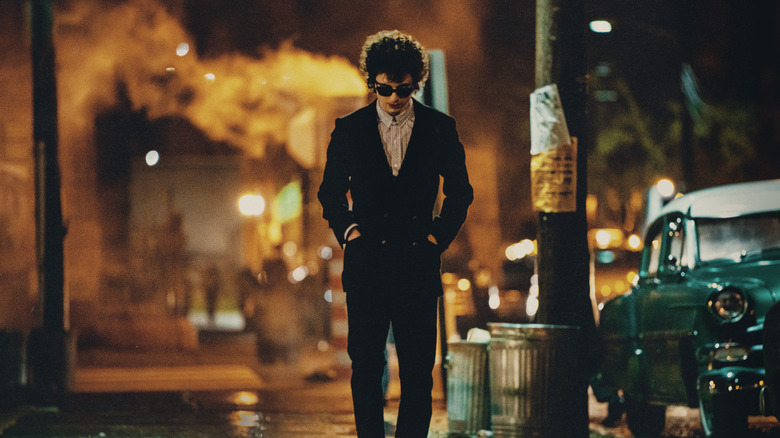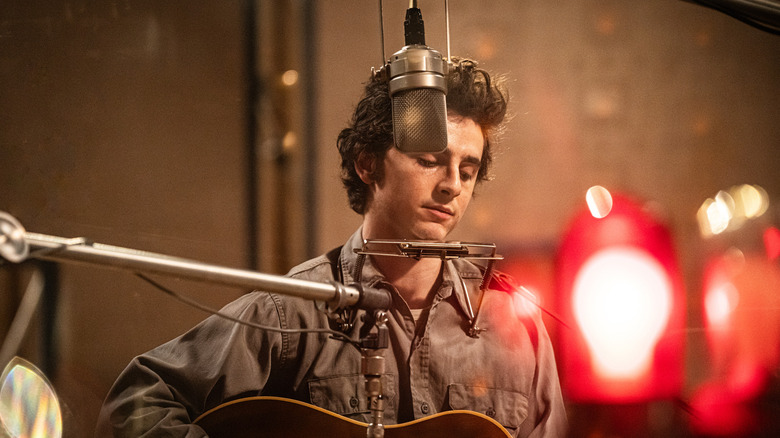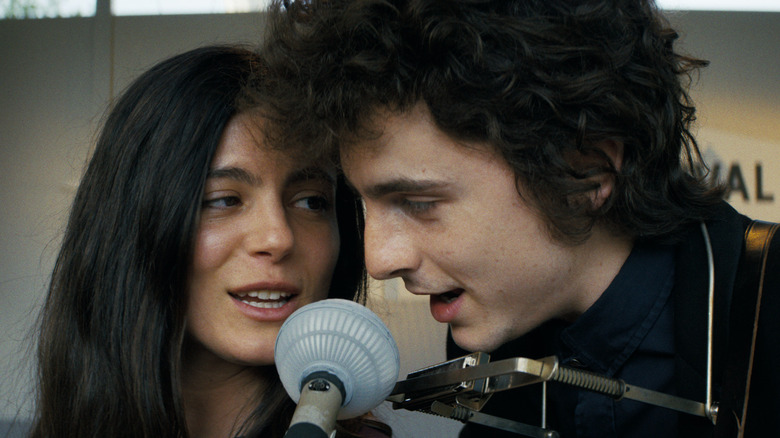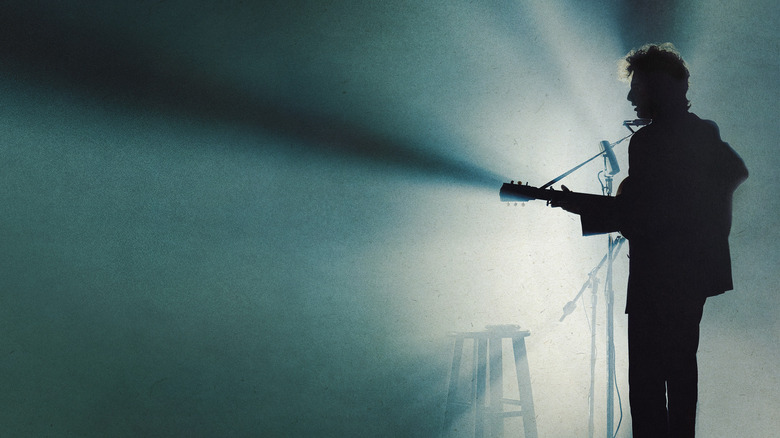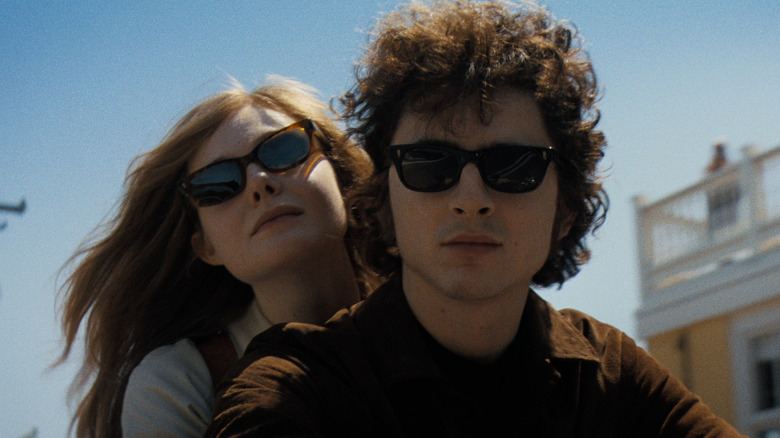A Complete Unknown Review: Timothée Chalamet Does A Pretty Good Bob Dylan Impression In This Safe But Enjoyable Biopic
In 2007, Jake Kasdan's hilarious "Walk Hard: The Dewey Cox Story" arrived to take the piss out of musician biopics. Focusing on the fictional Dewey Cox (played memorably by John C. Reilly), "Walk Hard" was a parody of the musician biopic in general, but specifically lambasted the then-recent films "Ray," Taylor Hackford's flick about Ray Charles, and "Walk the Line," James Mangold's look at the life of Johnny Cash. It was a brilliant, biting send-up of everything wrong with those films: the lazy shortcuts they take in condensing a famous person's entire life, the by-the-numbers approach to an artist's rise and fall and inevitable redemption, the seemingly endless parade of familiar supporting characters who pop up and have their full, famous names uttered out loud so we know who they are ("What do you think, George Harrison of The Beatles?"). The satire and parody of "Walk Hard" is so sharp, so cutting, that one can't help but think that if the film had been a massive hit it would've more or less killed the musician biopic entirely.
But "Walk Hard" was not a hit. It now has a healthy cult following, but the film flopped at the box office, and the musician biopic was free to live another lazy day. While there are occasional bright spots in this genre (Baz Luhrmann's unapologetically bonkers "Elvis" is a hoot, and Dexter Fletcher's Elton John musical "Rocketman" is surprisingly sturdy), the majority of the movies are often dire (the Queen/Freddie Mercury movie "Bohemian Rhapsody" may be an Oscar-winning box office smash, but it absolutely stinks to high heaven). And while "Walk Hard" may not have been a hit, every musician biopic that arrives now lives in its shadow.
So you have to give some credit to James Mangold for his 2024 Bob Dylan movie "A Complete Unknown." Mangold's "Walk the Line" was one of the films "Walk Hard" so mercilessly mocked, so I suppose it took a certain bravery for Mangold to return to the musician biopic well yet again. On top of that, Mangold also has to contend with the existence of Todd Haynes' brilliant, unconventional Dylan neo-biopic "I'm Not There." Dylan was and is an artist who continued to reinvent himself over his long career. There's no one Bob Dylan persona. Dylan is a shapeshifter; a constant performer always putting on an act. An enigma. To convey this in cinematic language, Haynes' movie took the interesting approach of having multiple actors play various Dylan personas, including "The Dark Knight" co-stars Heath Ledger and Christian Bale, and, most memorably, Cate Blanchett. Perhaps wisely realizing he couldn't compete with Haynes' approach, Mangold plays things predictably safe.
Timothée Chalamet does a pretty good Bob Dylan impression
Maybe this isn't really a problem, because the end result is a well-made, well-acted, entirely enjoyable movie that will likely play well with a wide audience. But as an artist, Bob Dylan was anything but "safe." Hell, two of the taglines slapped across the film's posters are "He defied everyone to change everything," and, "The ballad of a true original." Does that sound like the type of artist who deserves a by-the-numbers biopic?
And yet ... I can't deny that Mangold's movie is quite entertaining. It helps that the film is loaded with many of Dylan's greatest songs, which aren't the original recordings but are instead performed by the person playing him, Timothée Chalamet. Chalamet is a good actor, and here, he's faced with the difficult task of embodying one of the most iconic figures in the history of music and pop culture in general. Bob Dylan is so distinct that anyone portraying him runs a serious risk of dipping into impersonation, impression, or near-parody. After all, part of the reason Dylan became so famous is that his strange voice/singing style was so unique ("a voice like sand and glue," as David Bowie sings in "Song for Bob Dylan"). Chalamet does a pretty good job sounding like Dylan in terms of both his singing and speaking, but at the same time, the actor can't quite escape the realm of impression. The performance gets the job done, but there's never really a moment here were we believe that Chalamet has become Bob Dylan; he's merely doing a passing imitation.
I suppose you could argue that that's not entirely unwarranted, as one of the themes of the film is the fact that Dylan himself was seemingly always putting on an act and doing impressions of singers and artists he admired. He was playing a part and trying to build a new version of himself with seemingly every passing year. As "A Complete Unknown" begins, its 1961, and a young Bobby Dylan has just hitched his way into New York City with the hopes of meeting his hero, singer Woody Guthrie. But Guthrie, played by Scoot McNairy, isn't in New York — he's in a mental hospital in New Jersey, bedridden and unable to talk (Guthrie was suffering from Huntington's disease). Dylan finds his way to Guthrie's hospital room, where the fabled singer is being visited by his good friend, folk singer Pete Seeger (an adorably nice Edward Norton). Dylan plays Guthrie and Seeger a song ("Song to Woody"), which mightily impresses both men. And in that one bright, shining moment, the legend of Bob Dylan is seemingly born.
A Complete Unknown gives the women in Bob Dylan's life very little to do
From this moment, "A Complete Unknown" moves at a steady pace showing Dylan's seemingly meteoric rise. He begins playing folk clubs (although he's quick to point out to Seeger that he doesn't really consider himself a "folk singer," a fact that Seeger seemingly or willfully ignores), lands a manager (a much-too-over-the-top Dan Fogler, playing Dylan's real-life manager Albert Grossman), and begins cutting albums. He also catches the eye of folk superstar Joan Baez, played by the absolutely luminous Monica Barbaro. Part of the reason Dylan's career took off was that Baez helped make his songs popular by covering them with her beautiful voice and had Dylan open for her on several occasions, and while this is briefly touched on in the movie, it often feels like the narrative isn't giving Baez her due. I frequently found myself wishing we were getting a Joan Baez biopic with Barbaro as the focus instead. But this is Bob Dylan's story, or at least a Hollywood-ized version of it, and the film tracks how this kid from Minnesota suddenly found himself becoming a widely-known celebrity, unable to walk down the street without someone calling out his name.
While Bob and Joan have an on-again/off-again affair as the years tick on, Dylan also enters into a relationship with artist Sylvie Russo, played by Elle Fanning (Russo is based on Suze Rotolo, the woman who appears with Dylan on the famous cover of "The Freewheelin' Bob Dylan"). Unfortunately, Fanning is given very little to work with here. Her character has little more to do but stand on the sidelines and frown as she realizes Dylan is drifting away from her, and while the real Dylan has spoken of Rotolo's influence on his life and art, the script, by Mangold and Jay Cocks, never really convinces us of this love affair, even though it frequently has Dylan come crawling back, hoping for a second, or third, or fourth chance. The script also gets clumsy with awkward exposition delivered to denote the passage of time; at one point, Dylan stumbles into Sylvie's apartment late one night, and Fanning has to deliver this clunker: "We broke up Bob, don't you remember?"
A Complete Unknown wisely only focuses on a specific period of Bob Dylan's life
As "A Complete Unknown" unfolds through the early '60s, Dylan's fame grows to alarming levels, all while Dylan himself is growing restless. One of the brilliant touches of "I'm Not There" was how it conveyed that Dylan himself is an shapeshifting enigma. "A Complete Unknown" is touching on this as well (I mean, hell, it's right there in the title), but what it's really hammering home is the idea that Dylan is an artist entirely uncomfortable with celebrity; he wants to create, he doesn't want to be famous. And while that may be true, it's a tired and hoary biopic cliche that we've seen so many times already that it feels entirely stale here. What keeps "A Complete Unknown" from being bogged down by this approach is how it handles Dylan's reaction: he becomes kind of an a-hole, and the movie never really tires to let him off the hook or make excuses. Joan Baez is seemingly the only person in Dylan's life willing to call the singer on his b.s., while everyone else puts him on a pedestal as a great, brilliant artist. To be clear: Dylan is a great, brilliant artist. But as portrayed in "A Complete Unknown," he's also a huge jerk who eventually turned on everyone who helped him get started.
I don't think Mangold is judging Dylan for this. I think he's merely presenting things in an honest, matter-of-fact way. It's a tough balancing act, because this approach runs the risk of making Dylan completely unlikable. But to Chalamet's credit, he keeps Dylan sympathetic, even as he grows more and more alienating and rude to the people around him. The Bob Dylan of "A Complete Unknown" resents being labeled so much that he's willing to blow everything up if it means he can become someone, and something else. It's telling that the film gives us that early moment where Dylan pointedly tells Pete Seeger he doesn't see himself as a folk singer, even if that's what Seeger sees him as.
All of this is building towards the film's big crescendo: Dylan going electric. Even people casually familiar with Dylan's history likely know the minimal details: that Dylan eventually threw off his folk singer persona to embrace a full band and electric guitars, something that was tantamount to a betrayal to the folk fans who made him their god. While Mangold could've easily turned "A Complete Unknown" into a long-ranging life story, he wisely limits the film to a specific period in Dylan's life: his rise to fame and his sudden, drastic artistic shift that altered his legacy and produced one of the greatest albums of all time, "Highway 61 Revisited." At the same time, Dylan's career stretched on long after that album. Maybe they're saving that stuff for the sequel.
Despite its flaws, A Complete Unknown is enjoyable
Through all of this, Mangold employs all the familiar musician biopic shorthand that "Walk Hard" so perfectly ridiculed. "A Complete Unknown" is on sturdier footing than "Ray" and "Walk the Line," but it still feels too sanitized, too predictable, too safe. Depicting the artistic process is not easy, so "A Complete Unknown" falls back on the familiar, tired trope of having its artist sit a typewriter or strum a guitar and ponder while someone else (usually a female character) hangs out in the background wondering what they're doing. The movie also uses one of my least-favorite musician biopic cliches: the moment where the brilliant musician starts playing their brilliant new song and someone in the audience suddenly stops what they're doing and looks up, astounded at the brilliant magic they're suddenly hearing!
And yet, Mangold also does manage to make some of that magic work. The scene where Chalamet's Dylan plays "The Times They Are a-Changin'" for an enraptured festival audience is genuinely electrifying, to the point where I felt chills run up and down my body (or maybe it's just because the song itself is so damn good). And I got a kick out of the pen-pal friendship that develops between Dylan and Boyd Holbrook's rootin' tootin' son-of-a-gun version of Johnny Cash (Holbrook seems much more authentic as the Man in Black than Joaquin Phoenix did in Mangold's "Walk the Line," for what it's worth).
Every critic fiber of my being wants to brush off how safe, how generic "A Complete Unknown" can be. But gosh, I still found myself enjoying the flick. It's far too polished for its own good, and unlike the real Bob Dylan, it's terrified of taking risks. But Mangold is good at what he does, and what he does is make entertaining movies that play well with a crowd. And as I previously said, it certainly helps that "A Complete Unknown" is loaded with wall-to-wall Bob Dylan songs — songs I used to listen to on a constant loop when I went through my initial Dylan phase in my late teens and early 20s. And when the movie ended, I drove home from the screening blasting "Highway 61 Revisited" at full volume, charged up and feeling high on the music. "A Complete Unknown" doesn't break new ground, but it knows how to play the hits.
/Film Rating: 7 out of 10
